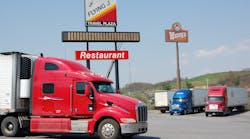It’s an issue that’s been the subject of five formal studies since 1996 and one upon which several technology research projects are now busily grappling with: a shortage of truck parking spaces along major freight corridors in the U.S.
“This is definitely not a new issue; we’ve been tracking it since back in the mid 1990s,” explained Tom Kearney, manager of freight operations for the Federal Highway Administration (FHWA) during a webinar this week sponsored by the Trucking Industry Mobility & Technology Coalition (TIMTC); a group comprised of government agencies and industry associations.
Kearney noted that when FHWA went to disburse $34 million worth of discretionary funds dedicated to the truck parking issue several years ago, it received $231 million worth of grant proposals – a clear indicator, he said, of how widespread the demand is for parking solutions.
Dan Murray, VP-research for the American Transportation Research Institute (ATRI), noted that truck parking ranked number eight on the group’s list of top 10 industry concerns for 2012 – the first time this issue made the top 10 list in six years ATRI has been compiling it.
Murray said the group recently completed a short survey on the parking issue, polling 242 drivers and 93 carriers, and found that the two most important factors fueling concern over the shortage of truck parking revolve around fatigue management and how to remain in compliance with hours of service (HOS) regulations.
“For drivers, HOS compliance/fatigue management ranked 1.8 while for carriers it ranked 1.9; far and away the most critical issues,” he explained. “The next on the list – the need to access showers and restroom facilities – ranked only 4.4 and 5.0, respectively, in terms of importance.”
Murray said that indicates that truck parking is viewed as a safety and compliance issue by the industry; not an issue of convenience.
Indeed, Ted Morris with the computer science department at the University of Minnesota, noted that according to data compiled by the National Highway Traffic Safety Administration in 2010, while trucks comprise 7% of all vehicle travel in the U.S., truck crashes are responsible for 12% of all highway fatalities – with fatigue on the park of truck drivers playing a role in 30% to 40% of truck crashes, with 31% of truck driver fatalities related to fatigue.
“That’s one reason why truck parking has crept up into the ATRI’s top 10 concern list; it’s a major safety issue,” he said.
The University of Minnesota is leading a project that’s testing a truck parking availability system (TPAS) aimed at using technology – in this case, a network of cameras tied by wireless networks into a central database – to more effectively manage public truck parking slots along the highway.
The project is currently managing cameras at one rest stop along I-94 in Minnesota, with camera systems at three more rest stops due to go online in 2013.
Morris said the system accurately detects available parking spaces 97% of the time and conveys that information to drivers through three different portals: via a web site on the internet (www.smartpark4trucks.com), a smart phone app, and what’s called variable messaging signage (VMS) positioned in two locations, one placed 20 to 30 minutes away from the rest stop and another placed 2 miles from it.
“What we’re trying to do is help eliminate a major driver dilemma when it comes to parking,” Morris said. “Do I park illegally to get rest or keep driving while tired?”
The real trick to fostering wider use of such technology, however, is getting the trucking industry to pay for it, explained Dave Miller, founder and COO of Gnosis Management and formerly senior VP for LTL carrier Con-way, Inc.
“Fleet managers are just now trying to get their brains around the concept that parking that’s not going to be free anymore,” he said. “Of course, [parking] has never really been ‘free’ as it’s been paid for by diesel fuel taxes and embedded within the cost of services provided by truck stops and other private entities.”
Miller added that cost effectively operating a truck parking reservation system, as well as disseminating accurate and reliable information to drivers without distracting them, are other key challenges as well.
Indeed, Miller’s firm is helping oversee a truck parking management similar to that going on in Minnesota along I-94 in Michigan; a highway that carries a heavy amount of cross-border truck traffic between the U.S. and Canada.
“Accuracy and reliability are two of the huge concerns with our project going forward,” he said. “The real evaluation period for our technology will run from January through November 2014.”



